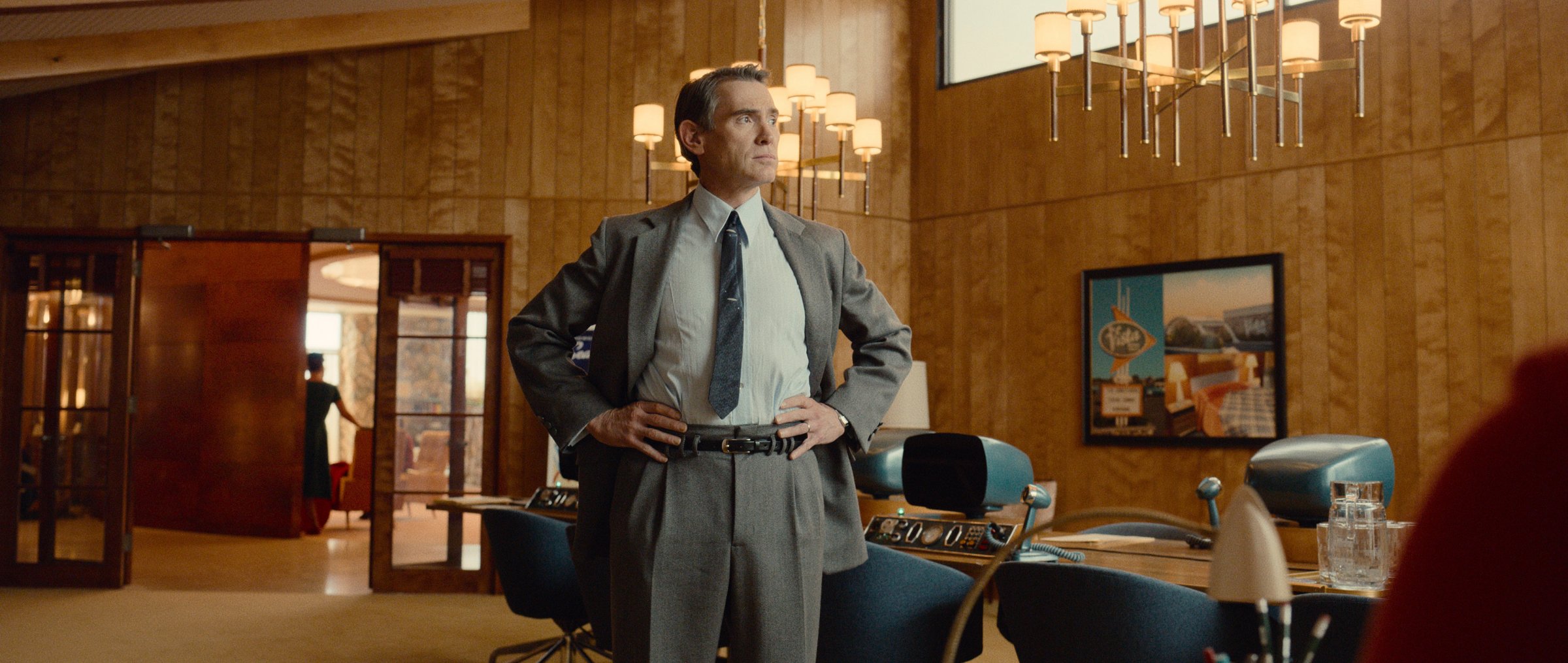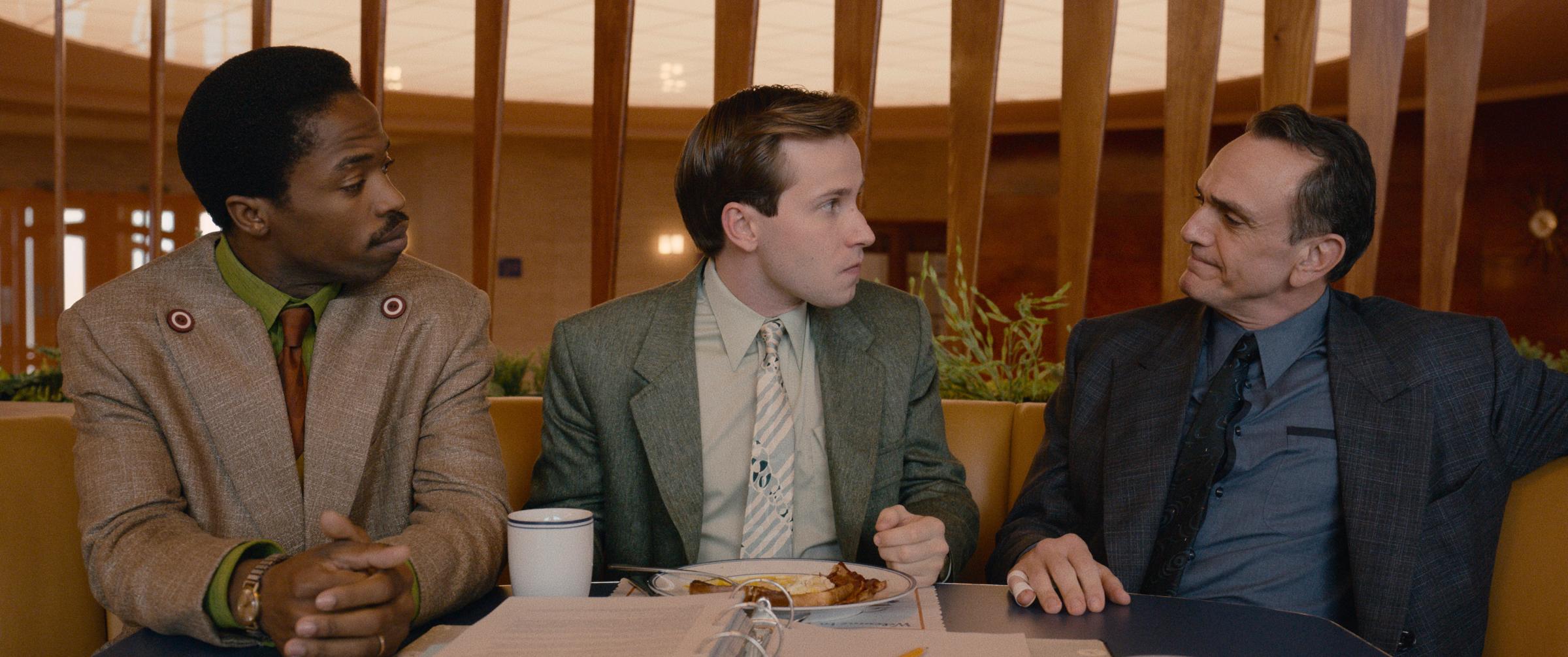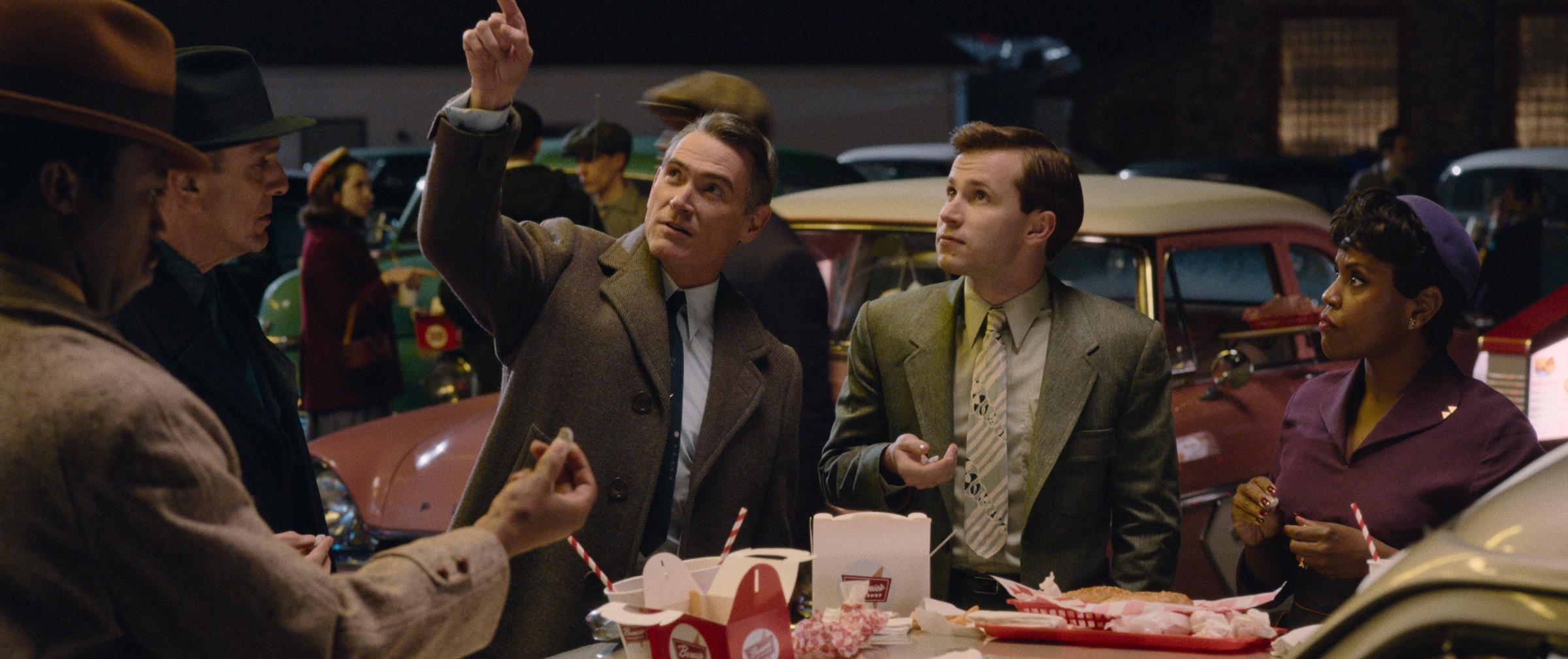
Remember the future? No, not the future of inequality, pandemics, and climate crisis we actually seem to be slouching towards. I’m talking about the kitschily utopian vision of the future that prevailed during the prosperous postwar years, all flying cars with tail fins and robot bartenders and mid-century modern design. Was it all a vicious lie, or just a dream that never came true?
This is the central question of Hello Tomorrow!, a clever, vividly realized but frustratingly paced Apple TV+ sci-fi dramedy that premieres on Feb. 17. Set in a retro-futuristic suburbia that resembles Leave It to Beaver’s Mayfield upgraded with robotic pets, self-driving hover-vans with cartoon-stork delivery people projected on their windshields, and the odd jet-pack commuter, the series follows a team of traveling salespeople hawking surprisingly affordable houses on the moon. Given the nature of their product—and the fact that lunar living has thus far been a privilege reserved for the super-rich—the staff of the cheerfully named Brightside is really selling a dream. What remains to be seen is whether the company can deliver on their big promises.

The team’s leader, and the show’s antihero, is executive producer Billy Crudup’s charismatic regional manager Jack Billings, whose passionate style and intuitive way of forging personal connections makes him a persuasive salesman. In the opening scene, we watch him take a seat next to a sad-sack older man at the counter of an old-school diner (albeit one whose robot waitress doubles a beer tap) and tries various angles until he finds one that resonates. When Jack realizes his mark needs to believe that a new home on the moon will repair his broken relationship with his daughter, he unfurls a tale of his own wife and kids living a couple hundred thousand miles away in a Brightside idyll. “Family: a man’s top treasure,” he proclaims. And the deal is done. The thing is, Jack’s wife, Marie (Annie McNamara), and son, Joey (Nicholas Podany), live in an earthly town called Vistaville, and they haven’t heard from him in years.
So things are bound to get interesting when Jack’s team is suddenly sent to Vistaville, where they set up a home base at the stylish Vista Motor Lodge while he runs off to visit his nagging mother (a marvelously annoying Jacki Weaver) at the local nursing home. Later, one of his signature inspirational presentations veers into dark territory. “Can we agree that hopelessness is not a top seller?” one salesman, Hank Azaria’s problem gambler Ed, complains to another, the stiff yet eager Herb (Dewshane Williams). Jack’s shrewd girl Friday Shirley (Haneefah Wood), who is married but considering a move to the moon with Ed, rounds out the team—until Jack hires Joey and takes the young man under his wing without confessing who he really is.
After an intriguing, well-balanced premiere, Hello Tomorrow! stalls out a bit. Its conflicts are relatively simple, yet first-time creators Amit Bhalla and Lucas Jansen spend roughly half of the 10-episode season getting the plot off the ground, so to speak. Brightside’s antagonists, who eventually include a bumbling, rules-obsessed bureaucrat (Matthew Maher) and a violently disgruntled housewife played by Alison Pill, read as types more than layered characters. (While the show’s retro future is apparently post-racial, helpmates in circle skirts still kiss their office-bound husbands goodbye at the front door every morning.) Jack’s team feels somewhat underwritten, too. Each is defined more by their challenges—Shirley’s infidelity, Ed’s debts, Joe’s directionlessness, Herb’s impending fatherhood—than by their personalities or histories.

Yet the show improves vastly once it finally builds momentum, and it has enough going for it even in the early, slow episodes to merit patience. A score by Mark Mothersbaugh mixes Old Hollywood poignance with sci-fi oddness. Production designer Maya Siegel (The Girlfriend Experience) conjures an American landscape so simultaneously nostalgic and imaginative that the actors are rarely burdened with delivering exposition; their gorgeously rendered surroundings accomplish most of the requisite world-building within the first few scenes. Hello Tomorrow! has plenty of subtle humor, from Ed’s gentle hazing of Joey to a robot cop that springs into action when a character uses the voice command “arrest prompt F.”
Wood and Azaria are standouts among a cast with zero weak links. But it’s Crudup, who won an Emmy in 2020 for carrying The Morning Show, in the lead role who really makes the show work. Like an upbeat Don Draper, Jack is a genius at using his own wounds to draw out customers’ desires and attaching them to products they probably should not purchase. He is not, however, the kind of nihilistic or sociopathic scammer (Elizabeth Holmes, Anna Delvey, Adam Neumann) we saw fictionalized in so many of last year’s buzziest TV docudramas. A lonely, broken man who treats his employees with familial benevolence, Jack says things like: “We’re not just selling; we’re changing lives” and “That’s not lying. It’s making things possible.” This isn’t cynical manipulation. You can tell he really believes his deceptions are making dreams come true.
There’s no doubt that Bhalla and Jansen press too hard, in this first season, on the idea that one person’s lie is another person’s dream. Still, the creators do ultimately take that theme in a fascinating and unexpected direction, which should make for a stronger second season should the series be renewed. Hello Tomorrow! has yet to develop the depth, complexity, or nuance that would earn it more holistic comparisons to Mad Men, which gave us so many indelible characters. But maybe Jack’s reckless optimism is contagious, because I came out of the finale convinced that the sky—if not the surface of the moon—is the limit.
More Must-Reads from TIME
- Donald Trump Is TIME's 2024 Person of the Year
- Why We Chose Trump as Person of the Year
- Is Intermittent Fasting Good or Bad for You?
- The 100 Must-Read Books of 2024
- The 20 Best Christmas TV Episodes
- Column: If Optimism Feels Ridiculous Now, Try Hope
- The Future of Climate Action Is Trade Policy
- Merle Bombardieri Is Helping People Make the Baby Decision
Contact us at letters@time.com